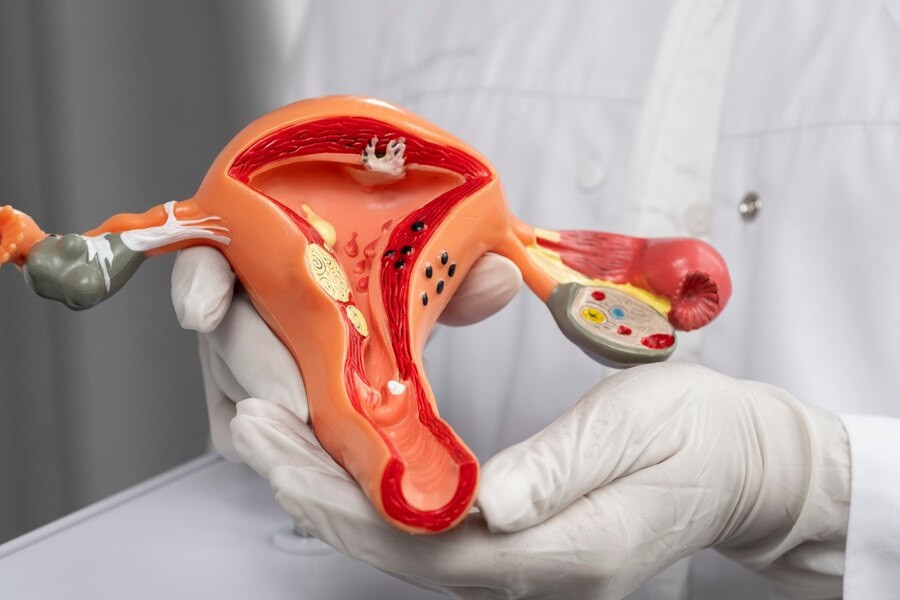Fertilization generally takes place in the fallopian tubes, where the released egg meets sperm. Once fertilized, the egg travels to the uterus to attach and develop.
However, fertilized eggs do not always attach and grow in the uterus. An ectopic pregnancy occurs when the embryo attaches outside the uterus, such as in the fallopian tubes or ovaries. This condition can be dangerous for the mother, potentially resulting in internal bleeding and even death.
Early signs of ectopic pregnancy
The symptoms of an ectopic pregnancy are non-specific and vague at first, making detection difficult. You may experience typical pregnancy symptoms like late periods, breast tenderness, nausea, and a positive pregnancy test.
However, as the pregnancy progresses, you will notice the early signs of an ectopic pregnancy, such as:
- Lower back pain
- Abdominal pain and vomiting
- Sharp abdominal cramps
- Pain on one side of the body
- Dizziness
- Body weakness
- Pain in the shoulder, neck, or rectum
If you have a positive pregnancy test and experience any of the symptoms listed above, see a doctor immediately. Ectopic pregnancy is a medical emergency. If the embryo develops in the fallopian tubes, the tubes may tear or rupture.
Signs of fallopian tube rupture
A torn or ruptured fallopian tube is a medical emergency condition characterized by the following symptoms:
- severe abdominal pain, particularly on one side
- Heavy vaginal bleeding
- Headache
- Shoulder pain
- Fainting
Complications of ectopic pregnancy
Ectopic pregnancy cannot be allowed to develop because other places, such as the fallopian tubes, are not suitable for fetal development. The uterus is very elastic, making it an ideal place for the fetus to grow and develop.
Heavy bleeding from a ruptured fallopian tube can lead to hemorrhagic shock, in which the body loses a large amount of blood. Ectopic pregnancies can cause damage to the fallopian tubes, and if the damage is severe, the doctor may need to surgically remove the tubes. However, because you have two fallopian tubes, you still have a chance of becoming pregnant in the future if one of them remains healthy.
Treatment for ectopic pregnancy
Treatment for ectopic pregnancy depends on where the pregnancy occurs, its severity, and other health conditions. Treatment options may include:
- Prescription medications such as methotrexate can help stop the growth of cells developing outside the uterus.
- Laparoscopic procedure to remove the abnormal egg and the damaged part of the fallopian tube.
Following treatment, you will still require regular doctor monitoring and check-ups. The doctor will ensure that the treatment is successful and that no further complications occur. You will also need to rest for at least two menstrual cycles to ensure that your body is fully recovered before considering another pregnancy.
If you plan to become pregnant, you should wait at least three months after treatment. Discuss your pregnancy plans with your doctor to ensure that your body is properly prepared.
If you need medical advice or consultation, you can either visit a doctor or make use of the consultation features that are available in the Ai Care application by downloading the Ai Care application from the App Store or Play Store.
Looking for more information about other diseases? Click here!
- Sean Edbert Lim, MBBS
Shishira Sreenivas (2023). Ectopic Pregnancy: What to Know. Available from: https://www.webmd.com/baby/pregnancy-ectopic-pregnancy
Mayo Clinic (2022). Ectopic pregnancy. Available from: https://www.mayoclinic.org/diseases-conditions/ectopic-pregnancy/symptoms-causes/syc-20372088
Better Health Channel. Pregnancy - signs and symptoms. Available from: https://www.betterhealth.vic.gov.au/health/healthyliving/pregnancy-signs-and-symptoms
Marissa Selner (2023). Ectopic Pregnancy. Available from: https://www.healthline.com/health/pregnancy/ectopic-pregnancy
The American College of Obstetricians and Gynecologists (2018). Ectopic Pregnancy. Available from: https://www.acog.org/womens-health/faqs/ectopic-pregnancy
NHS UK (2022). Ectopic pregnancy. Available from: https://www.nhs.uk/conditions/ectopic-pregnancy/symptoms/
April Kahn (2023). Hemorrhagic Shock. Available from: https://www.healthline.com/health/hemorrhagic-shock
NHS UK (2022). Ectopic pregnancy. Available from: https://www.nhs.uk/conditions/ectopic-pregnancy/









